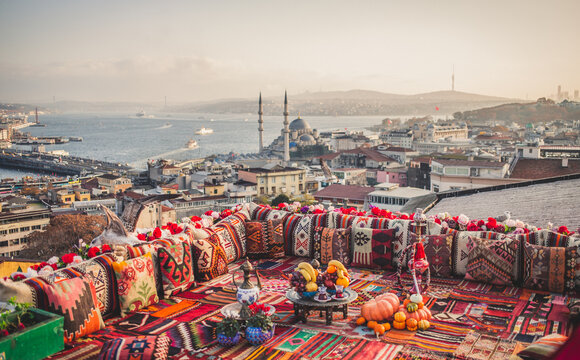Travellers have been enthralled by Turkey for ages since it is a place where East and West collide. The lives of its citizens are still shaped by the rich tapestry of traditions and rituals that are deeply ingrained in history and to have knowledge about this could be a plus in your Turkey Travel. This article offers a fascinating peek into the colourful local life that characterises this alluring country as we go through the heart of Turkish customs and culture.
- Breakfast, food, and bread
Turkish culture revolves around food in many ways. Turkish women typically spend time in the kitchen preparing elaborate meals because they believe that every meal is an offering from Allah that should be enjoyed and not wasted. The most significant meal of the day is breakfast, which traditionally consists of eggs, cucumbers, tomatoes, and olives.
However, bread should always be included at every meal, whether it be morning or any other meal. It is a common food in Turks’ diets and is widely available.
The Nazar Boncugu possesses an evil eye
The Nazar Boncugu, referred to as the evil eye, is present in workplaces, residences, places of business, and transportation, which is blatantly against Islamic customs. You will find that during your Turkey Travel, Turks think this amulet wards off evil in addition to playing a significant role in Turkish culture and being among the top recommended souvenirs to buy.
Turkish Carpets and Rugs
Rugs and carpets adorn the floors of every Turkish home. The carpets that are handmade have also gained popularity as holiday mementos due to their intricate decoration. Unfortunately, some dishonest salespeople continue the practice started by the nomadic tribes and sell phoney Turkish carpets. Some Turks now choose the factory-made carpets as well, which are frequently less expensive, as interior design trends have gotten more contemporary.
Shoes, dining, and gifts in hospitality
Turks are friendly people who frequently invite new friends over to their home for a gathering for dinner. Visitors are provided with slippers so they may leave their footwear at the door, and there will be plenty of food presented, which it would be impolite to decline. A present is not asked for at this time, but if you want to follow western tradition and bring a glass of wine, make sure the hosts enjoy it first. Many people only drink when they are out of the house or are teetotal.
Tea and beverages
Turkish music and dance are vibrant reflections of the country’s rich cultural tapestry. With a diverse spectrum that spans classical Ottoman compositions to contemporary pop hits, Turkish music captivates with its melodious intricacies. Traditional instruments like the hauntingly beautiful ney, a reed flute, and the soulful oud, a stringed instrument, infuse a timeless charm into the music. On the dance front, Turkey boasts a dynamic repertoire. The energetic and communal “halay” dance, often performed at celebrations and gatherings, showcases the joyous spirit of the Turkish people. Meanwhile, the sensuous and mesmerising “belly dance” or “oriental dance” is an art form that weaves stories through graceful movements, adding an element of allure to Turkish culture.
Turkish clothes
In Turkey, people’s attitudes toward clothing are generally liberated and prominently reflect Islamic tradition. Men frequently wear business suits, jackets, and ties in the workplace, and many Turks choose them over traditional clothing for festivities and national holidays. But women address the topic more creatively; in everyday life, particularly in the provinces, the national costume still holds its place, and for the feast, Turkish women choose their bright, very functional clothes, enhanced with many accessories.
Common Salutations and Expressions
Turks enjoy celebrating or empathising, and they frequently use idioms to describe ordinary or extraordinary happenings. “Gecmis Olsun,” which means get well soon, should be said to a sick friend. The phrase “HosGeldiniz” (welcome) may be heard as you enter a store. The list continues endlessly, but the positive news for visitors from other countries is the fact that Turks are generally laid back. Although knowing a few Turkish proverbs will give you tremendous respect, do not worry about the little things because you are a valued visitor in Turkey.
Children, Birth, and Pregnancy: The Birth of a Child
Turkish people enjoy kids, so don’t be shocked if they give your youngster their complete attention. The children symbolise increasing strength because they grow the family and increase its size. After marriage, getting pregnant is the next logical step, and anyone who refuses to have children or is unable to get pregnant may become the subject of rumours or face societal pressure in some cultures.
Since pregnancy is viewed as a need, many customs revolve around it, including cravings and sex determination. However, in more modern settings, couples have turned to the medical community to learn the sex of their kid. In tiny towns, some mothers choose to spend 40 days indoors in order to recover their health and give their newborns a healthy start in life.
Circumcision
Although many regions of the country still consider circumcision to be a religious obligation, procedures have significantly advanced over the past century. In the past, it was very uncommon for the neighbourhood elder to execute the rite on the kitchen table, but nowadays, more individuals are choosing hospital procedures, particularly in the western areas of the country. A gift, such as a special watch, is presented to the child to commemorate the occasion, which is traditionally recognized as the boy’s transition into a fully blooded male.
Turkey’s Hamam
This custom, which originated in Romans public bathhouses and was altered through the Ottomans, has been divided into two halves. Some Turkish baths cater to tourists because Westerners like to wear swimsuits while others serve the local population more traditionally, as evidenced by the weekly practice of women’s only day.
People enter the sauna unclothed or in a bathing suit and sit in it while dousing themselves in cold water. Dead skin can be effectively removed by using a lofar and lots of soap suds, and most tourist-oriented bathhouses also include an optional body massage.
Conclusion
Turkish customs and culture are so extensive and diverse that they defy easy categorization. The Turkish traditions of numerous people from Anatolia, the Mediterranean Sea, the Near East, the Caucasus region, Eastern Europe, Central Asia, and of course the ancient world have been blending into a singular alloy that we now refer to as Turkish or Minor Asia culture for thousands of years. So, get ready for your Turkey Travel as it’s a place where you can experience the past, present, and future all at once, making it a destination like no other.

